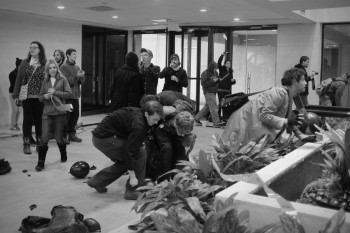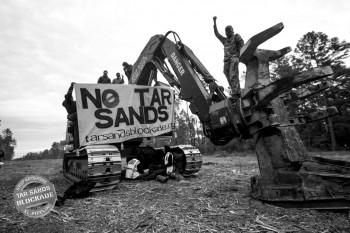by R. Shoalgrass
RP: Tell us about yourself and why you’re resisting the Keystone XL pipeline.
I’m a long-time resident of the great city of New Orleans. I’ve left my city for the time being after being inspired by the actions I witnessed going on around the Tar Sands Blockade in Northeast Texas. As a New Orleanian, I’ve always taken serious issue with the destruction caused by the oil industry, and it is hard not to feel called to action after learning about the dangers of the Keystone XL pipeline.

In Jan 2013, over 100 protesters occupy TransCanada’s offices in Houston & fill the lobby with tar balls
RP: Tell us what a day at the action camp looks like. What is the social and physical environment of the camp?
This campaign has become my new family and new home, wherever we might happen to be. I feel closer to many folks here than people I’ve known back in New Orleans for years. We’ve been through many a triumph, struggle and sleepless night. Our days start fairly early, with a communal breakfast and a morning circle where we each express our excitement about whatever we plan to work on for the day. Then we get to work. There are various “working groups” to meet the different needs of the campaign – art & media, scouting, building, legal & jail support, outreach, fundraising.
Up until a couple of months ago, we were operating as invited guests on privately-owned land the pipeline is slated to cut through, and which is home to our now well-known blockade tree village. The tables have turned, however, because the landowner was sued by TransCanada, the multibillion dollar corporation constructing the pipeline.The landowner was forced to claim a position against the blockade, evicting our camp from the land with which we’d developed such a strong connection. Since then, with the help of various landowners near the pipeline route, the campaign camp has lived in a few different places, relocating for mass action trainings and moving along with the pipeline’s construction. Small groups are breaking away from the main camp to organize resistance in other regions as well.
RP: How did this blockade come to be? How was it organized and how is it being maintained?
The major impetus was Obama’s speech in March when he gave an executive order expediting the construction of pipeline, which was basically a call for action in Texas. The blockade grew in East Texas due to the existing resistance and grassroots community organizing that was going on in the Denton area in particular.
David Daniel, the landowner of the original tree site, was an outspoken and often-quoted opponent of the Keystone Pipeline. He had spent years raising awareness about dangers of pipeline, so when organizers in Texas wanted to do something to stop it, he was a natural ally.
At present there is a decent-sized crew of folks working full-time fulfilling different roles supporting the blockade, from a stellar media team to skilled riggers to rad legal advisors.
RP: I noticed many people involved in the fight are actually natives of Texas, which isn’t always the case with environmentally focused direct action campaigns. Was this intentional? How has this aided the campaign?
This was especially true during the early stages of the campaign, but since the tree blockade action has gone live, awareness of Tar Sands Blockade has grown exponentially, and in recent months we have attracted a wide variety of rad people from all around the country, including a lot of folks with experience from the RAMPS campaign and Earth First! endeavors. Still, the initial strength in local organizing was what gave the campaign its strong footing.
RP: Have you experienced hostility or support from people in the communties where you’re organizing?
There is an interesting conflict of traditional values in this state: private property ownership and land rights are often in opposition to Texas’ ties to the oil and gas industry. Many conservative folks are lining up with the blockade in order to defend their land from seizure by TransCanada. We’ve actually had a great amount of local support from some wonderful East Texans.

Blockaders stop construction equipment in East Texas
RP: What kind of support have you received?
All sorts! From food donations to showers and places to stay to local legal representation to awareness bicycle rides. Many were willing to stand in front of the bulldozers along TransCanada’s path. One landowner, a great-grandmother, got arrested while defending her own land against the pipeline. Most local media has been fairly sympathetic and fair.
RP: What has your engagement with workers building the pipeline and clearing the area been like? What are your approaches for these interactions?
TransCanada workers are not a target of this campaign, though as the campaign goes on, it is more and more apparent that TransCanada is giving commands to the local police on how to deal with us. Workers have been trained to be stand-offish, and almost all of the workers we encounter are from out of state. Few local Texas jobs are resulting from this pipeline; at the Saltillo action only 1 vehicle out of 9 had Texas license plates.
RP: What other organizations, people, or movements are working on this issue, and how are you relating to them?
A letter of solidarity with our actions has been signed by thirty different environmental justice groups, including the Sierra Club, RAMPS, Greenpeace, Indigenous Environmental Network, Rising Tide, the Rainforest Action Network and many others. Websites like 350.org and Democracy! Now have given us a lot of coverage, and we’ve had celebrities such as Daryl Hannah and Green Party presidential candidate Jill Stein spend jail time in support of our actions.
RP: How does the Pipeline threaten the Gulf specifically?
Many of the materials being shipped from Asia to construct the pipeline are actually coming through the port of New Orleans. Tar sands oil will end up in refineries around the Gulf, a lot of it around the Houston area, where many folks, especially minorities, are already having to deal with the terrible consequences of living in the shadow of a refinery.
Spending time in the Manchester neighborhood there, where tar sands oil is already being refined at a Valero facility, I felt sick afer just a few hours. I saw trees dying that were healthy in other parts of the city. Tar sands has 9 times the sulfur content of conventional crude, and the slurry in this pipeline is extremely high in carcinogens that will eventually leak and get into the water. The tar sands pipeline represents the largest expansion of oil into the Gulf in recent history. We are also facing threats from other pipelines currently being constructed, such as the Parkway Pipeline set to go through Lake Ponchartrain.
RP: Why take direct actions, and not other actions such as legislative action or electing anti-Pipeline politicians?
Everything possible has been done to stop the pipeline using the institutions you mention. Politicians have been petitioned; the people impacted have still been ignored. Direct action is all we have left.
Share